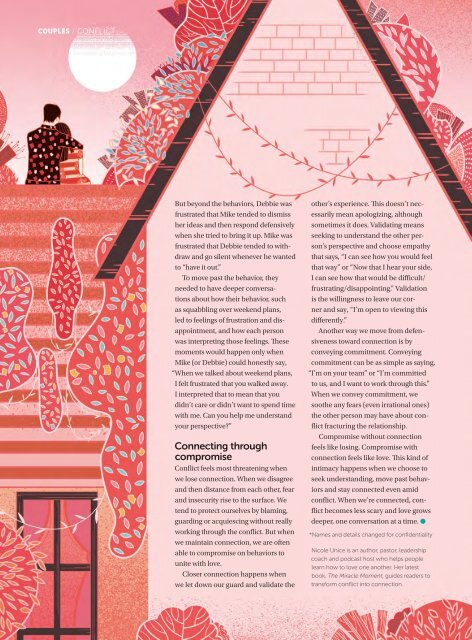Focus on the Family Magazine - April/May 2022
It can be a struggle to raise a family while balancing your work life, social life and relationships. Focus on the Family magazine is here to help! Each complimentary issue delivers fresh, practical Biblical guidance on family and life topics. Every issue comes packed with relevant advice to build up your kids, strengthen your marriage, navigate entertainment and culture, and handle common challenges you may face in your marriage and parenting journeys. Plus you'll find seasonal advice ranging from back-to-school activities to date night tips for you and your spouse.
It can be a struggle to raise a family while balancing your work life, social life and relationships. Focus on the Family magazine is here to help! Each complimentary issue delivers fresh, practical Biblical guidance on family and life topics.
Every issue comes packed with relevant advice to build up your kids, strengthen your marriage, navigate entertainment and culture, and handle common challenges you may face in your marriage and parenting journeys. Plus you'll find seasonal advice ranging from back-to-school activities to date night tips for you and your spouse.
- No tags were found...
You also want an ePaper? Increase the reach of your titles
YUMPU automatically turns print PDFs into web optimized ePapers that Google loves.
COUPLES / CONFLICT<br />
But bey<strong>on</strong>d <strong>the</strong> behaviors, Debbie was<br />
frustrated that Mike tended to dismiss<br />
her ideas and <strong>the</strong>n resp<strong>on</strong>d defensively<br />
when she tried to bring it up. Mike was<br />
frustrated that Debbie tended to withdraw<br />
and go silent whenever he wanted<br />
to “have it out.”<br />
To move past <strong>the</strong> behavior, <strong>the</strong>y<br />
needed to have deeper c<strong>on</strong>versati<strong>on</strong>s<br />
about how <strong>the</strong>ir behavior, such<br />
as squabbling over weekend plans,<br />
led to feelings of frustrati<strong>on</strong> and disappointment,<br />
and how each pers<strong>on</strong><br />
was interpreting those feelings. These<br />
moments would happen <strong>on</strong>ly when<br />
Mike (or Debbie) could h<strong>on</strong>estly say,<br />
“When we talked about weekend plans,<br />
I felt frustrated that you walked away.<br />
I interpreted that to mean that you<br />
didn’t care or didn’t want to spend time<br />
with me. Can you help me understand<br />
your perspective?”<br />
C<strong>on</strong>necting through<br />
compromise<br />
C<strong>on</strong>flict feels most threatening when<br />
we lose c<strong>on</strong>necti<strong>on</strong>. When we disagree<br />
and <strong>the</strong>n distance from each o<strong>the</strong>r, fear<br />
and insecurity rise to <strong>the</strong> surface. We<br />
tend to protect ourselves by blaming,<br />
guarding or acquiescing without really<br />
working through <strong>the</strong> c<strong>on</strong>flict. But when<br />
we maintain c<strong>on</strong>necti<strong>on</strong>, we are often<br />
able to compromise <strong>on</strong> behaviors to<br />
unite with love.<br />
Closer c<strong>on</strong>necti<strong>on</strong> happens when<br />
we let down our guard and validate <strong>the</strong><br />
o<strong>the</strong>r’s experience. This doesn’t necessarily<br />
mean apologizing, although<br />
sometimes it does. Validating means<br />
seeking to understand <strong>the</strong> o<strong>the</strong>r pers<strong>on</strong>’s<br />
perspective and choose empathy<br />
that says, “I can see how you would feel<br />
that way” or “Now that I hear your side,<br />
I can see how that would be difficult/<br />
frustrating/disappointing.” Validati<strong>on</strong><br />
is <strong>the</strong> willingness to leave our corner<br />
and say, “I’m open to viewing this<br />
differently.”<br />
Ano<strong>the</strong>r way we move from defensiveness<br />
toward c<strong>on</strong>necti<strong>on</strong> is by<br />
c<strong>on</strong>veying commitment. C<strong>on</strong>veying<br />
commitment can be as simple as saying,<br />
“I’m <strong>on</strong> your team” or “I’m committed<br />
to us, and I want to work through this.”<br />
When we c<strong>on</strong>vey commitment, we<br />
soo<strong>the</strong> any fears (even irrati<strong>on</strong>al <strong>on</strong>es)<br />
<strong>the</strong> o<strong>the</strong>r pers<strong>on</strong> may have about c<strong>on</strong>flict<br />
fracturing <strong>the</strong> relati<strong>on</strong>ship.<br />
Compromise without c<strong>on</strong>necti<strong>on</strong><br />
feels like losing. Compromise with<br />
c<strong>on</strong>necti<strong>on</strong> feels like love. This kind of<br />
intimacy happens when we choose to<br />
seek understanding, move past behaviors<br />
and stay c<strong>on</strong>nected even amid<br />
c<strong>on</strong>flict. When we’re c<strong>on</strong>nected, c<strong>on</strong>flict<br />
becomes less scary and love grows<br />
deeper, <strong>on</strong>e c<strong>on</strong>versati<strong>on</strong> at a time. •<br />
*Names and details changed for c<strong>on</strong>fidentiality<br />
Nicole Unice is an author, pastor, leadership<br />
coach and podcast host who helps people<br />
learn how to love <strong>on</strong>e ano<strong>the</strong>r. Her latest<br />
book, The Miracle Moment, guides readers to<br />
transform c<strong>on</strong>flict into c<strong>on</strong>necti<strong>on</strong>.

















